
Len Bracken has lived in or visited over twenty-five countries, with those travels and his life-altering relationships with women inspiring his literary work. He was initially moved to write novels when put under the spell of a lesser-known Dostoevsky work while drifting in Moscow when he was 18 and to impress a Serbian medical student—his first absolute love. She prompted Bracken’s subsequent move to Paris, where he happened to see Sartre in the street. Although Bracken modeled his writing more on Camus, and later on the dissident surrealist Bataille, seeing the aging existentialist made the project of novel-writing seem more realistic to the teenager.
Yet Bracken's early attempts, notably those made during nine months in the Dominican Republic, didn't amount to much. It wasn't until he graduated from the university that he began writing on a daily basis: first in Newport, Rhode Island then in Springfield, Virginia and on to San Francisco, California and Englewood Cliffs, New Jersey. Russian writers remained important to him, notably Trifonov, along with a host of European writers, such as Kundera, who, in his early novels, was working in the tradition of Bataille.
Kundera took the expression of personal history in the context of world history to a new level that Bracken in turn aspires to surpass by foreshadowing, to an even greater extent, the sexual and political confluence of his characters' psychologies in what he calls “sex-pol” novels after Reich's analytical work under that name. Bracken published his first and second novels in Arlington, Virginia. His third novel—set in Paris and Barcelona—remains under wraps. He published his fourth novel, which is set in Washington, D.C., while living in that city.
An annotated bibliography of Len Bracken’s books in chronological order can be found here.
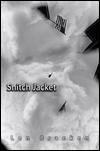
“By exposing and exploding the illusion of opposition between the world views of conspiracy theory and radical theory, a dangerous novel is created. ... Stylistically similar to pataphysics and informed by the Situationists and W. Reich, this is a fascinating read. Theory is woven seamlessly into the narrative in a way that does not interrupt the flow of the story. This work is important.”
Jason Rodgers, Media Junky
“Bracken’s first love is fiction, and there lies the rub. His novels are weird—some would say, intensely weird. Take the opening scene from his latest, ‘Snitch Jacket.’ An anarchist activist makes passionate love to a glamorous TV anchor. On the floor of the Library of Congress. While they’re both drunk on coca-infused wine. And a blaze they started begins to consume the national landmark. From such startling material, Bracken builds a bold fictional universe in which he mixes extreme politics, conspiracy theory, obscure cultural movements and—oh, yes—lots of explicit sex.”
Zach Dundas, Associated Press
“To a certain extent, nobody is completely what they portray themselves to be and, while everybody’s goals are pure and noble, their means are another matter altogether. Some are spying, might be spying, are converted over from the enemy.”
Stephen Siciliano, author of Vedette
“Len Bracken continues his assault on the powers that be with his new novel, ‘Snitch Jacket’: an intriguing expose of the political underworld in Washington, D.C. If you want to catch the tenor of the times, from opiated subversive sects to hubristic national security forces, with a generous tempo of eros and rage, this is the book for you. Look out for Len Bracken.”
Allan Graubard, author of ROMA AMOR
Read the complete reviews.
Browse Snitch Jacket via iUniverse.com.
229 pages—paperback—$15.95
Order Snitch Jacket from Amazon.com.
A brief excerpt of Snitch Jacket read by the author is available on YouTube.
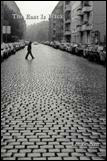
Long out of print and only ever available in limited editions that are now quite expensive, the infamous Berlin sex novel The East Is Black has been re-released in a new edition that can be browsed for free online at iUniverse.com.
“Originally published by the porno-publisher Masquerade under the title Stasi Slut, this is the integral version of the story of Adina, a young, naïve country girl who, in the time of German unification, settles down in Berlin. She is developing herself from an East German secret police (STASI) toy, to an autonomous squatter...It is an optimistic, perverted adventure on the alleviation of alienation, a joy for readers and also a generous FUCK YOU to the ugly, angry puritan outside world.”
Fort van Sjakoo
“Political pulp fiction at its best.”
AK Distribution
“Delightful details abound, from the depiction of Adina’s mother as a Catholic anti-Communist peasant, to the descriptions of filthy Berlin squats, to the graffiti which pops up like a Greek chorus to announce the story’s anarchist intent. It is clear that while Bracken loves his sex, what he really desires is to encourage readers to engage in ‘loving seditiously.’”
A. Smith, Fifth Estate
“The East Is Black stands as a prime example (perhaps the only one so far) of a new type of erotic novel, one where the social and sexual consciousness are uninhibited and integrated, free of strangulation from either a misguided political correctness or a reactionary puritanism.”
G.J. Krupey, Eidos
222 pages—paperback—$15.95
Order The East Is Black from Amazon.com.
A brief excerpt of The East Is Black read by the author is available on Vimeo.
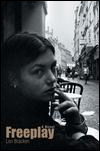
“There’s a growing trend in the modern imaginative novel to mimic the rapidfire intercut of information in our media age, collaging together a sort of holographic hyperdimensional text rather than plotting a simple linear story. I think of Moorcock’s Cornealius Chronicles, Shea & Wilson’s Illuminatus! trilogy, and Scholz & Harcourt’s Palimpsests on the professional scale, and the work of such writers as Don Webb, Misha and Mink Mole in the small presses. Well, this book is an unexpectedly delightful addition to the genre (which, in case you have any doubt, is one I appreciate very much).”
Mike Gunderloy, Factsheet Five
“Freeplay reminded me of a more techno-political version of Rainbow Bridge, the film about Jimi Hendrix ... I was impressed.”
Richard Peabody, author of Open Joints on Bridge
“From Cam’s initial meeting with Tancredo in a bar out of Sam Spade’s old haunts, to the debacle in Moscow, to the nirvanic finale, Freeplay kept me glued to the page. It would take someone totally devoid of imagination not to live each scene in this deftly crafted game.”
Jim Keith, Dharma Combat
“Bracken writes a fast-paced chronicle of a jet-set team of free spirits who channel their anger into the creative world of sensual and technological game playing. Bracken exploits the obvious in descriptive tantrums and doublespeak. Plenty for the metaphysical anarchist to chew on.”
Mark Hand, Incite
Freeplay is available from iUniverse.com—Paperback $16.95—ISBN: 0-595-41719-1
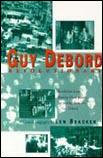
A critical biography written in plain English that chronologically follows the radical theorist’s fascinating life and work. Generous philosophical and historical background. Illustrations. Features a concise history of May 1968 Paris and a direct explanation of Debord’s famous book, Society of the Spectacle, with each thesis under discussion edited for clarity. Includes the author’s translation of Debord’s board game, Game of War.
“... a critical success." Le Monde.
“... Bracken has provided a rich, colorful and enthusiastic new biography. Bracken is clearly taken by his subject (it is hard not to be) but maintains the proper critical distance ... Bracken also provides an excellent summary of Debord’s Society of the Spectacle.”
Seminary Co-op Bookstore
“His films, including the film version of Society of the Spectacle, are beautifully described ...”
Class War
“When a work this scholarly is this readable, this provocative, it’s easy to recommend to others. Which I do, without hesitation. This is one of the best bios I’ve read in years.”
Sam Gaines, Eye
Extra Notes on Guy Debord—Revolutionary
Turning Gold into Lead: Translating Debord’s Society of the Spectacle
Feral House, 1997
267 pages—paperback—New and Used from $5.75
Order Guy Debord—Revolutionary from Amazon.com.
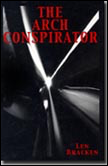
Essays and actions, using essays and aphorisms as instruments of actions. Features “The Zerowork Theory of Revolution including a General Theory of Civil War.” Illustrated with thirteen black and white photos by the author.
“In his latest work, Len Bracken is not solely a pro-situationist, historian, or conspiracy theorist : he is a chameleon. In fourteen different essays dealing with a wide range of topics from conspiracies to civil war, Bracken reveals himself as a drifter, journalist, outlaw banker, ghostwriter and more, weaving in and out of roles as easily as he does epochs in history.”
DM Yankowski, Clamor
“Where other conspiracy authors present conspiracies as though they were rare coins or exotic butterflies, Bracken presents them as a basic currency of history, a fundamental way that history is done, and perhaps might be undone. Where other conspiracy authors trade ideas in the whispered ink of underground publications, Bracken hands out pamphlets to newscasters, government officials, bankers and people on the street corner.”
Leif Fredrickson, Mumblage
“I didn't find the smoking gun here, but this appears to be not a single work, but a collection, perhaps of Bracken’s articles in the usual conspiracy publications. As such, this book will be of interest to Len Bracken fans (though not to fans of the redneck, Christian right, alien paranoids much published at the lowest sewer-like levels of the conspiracy and UFO presses—for this material presupposes that the reader has something of an education).”
Arcturus Books
Adventures Unlimited, 1999
344 pages—paperback—$14.95
Order The Arch Conspirator from Amazon.com.

In Shadow Government: 9-11 and State Terror, Len Bracken presents the case that states have used terror to defend themselves both directly, as with the Terror of the French Revolution, and indirectly, as with the strategy of tension in Italy—when the state used right-wing provocateurs disguised as left-wing agitators to discredit social protest, assassinate inconvenient politicians and justify a crackdown. The “Amerithrax Attack” chapter by Andrew Smith supports the state-terror thesis and Bracken’s epilogue shows how a shadow government has since covered the land like black ice. For those who question the authors’ ideological orientation, a timeline provides objective support for considering 9-11 and the ensuing anthrax operation as indirect defensive attacks.
“One of the more persuasive strategists, at least on this side of the Atlantic, is Len Bracken. By day, he’s a humble copy editor in Washington; by night, a novelist, biographer, amateur historian, translator, and underground essayist treasured in conspiracy circles, a man who never shows his face to his readers. The problem with conspiracy theories is that most of them are wrong. Still, if the turbulent, age-old story of statesmen conspiring to use terrorism to control their own populations can be believed, as Bracken successfully argues, then Shadow’s thesis raises more chilling questions than it answers. Why should 9-11 be anomalous? As Twain once remarked, history never repeats itself—but it does rhyme.”
Geoffrey Gray, Village Voice
“Bracken’s analysis has the precision of a watchmaker, but his watch piece is a time machine. His distinctive genre is the first to combine progressive anarchist philosophy and history with conspiracy journalism to bring the reader to an exceptionally broad and heightened state of awareness. This is the first of its kind. Anarchy has finally joined conspiracy and has realized we’re all hammering away at the same wall.”
Joan d’Arc, Paranoia
“Such a command of historical facts as well as a facile talent for weaving cohesive, potentially indicting arguments together makes this book a worthwhile read indeed. I’ll be amazed if the publisher isn’t ordered by the feds to shred all existing copies of The Shadow Government because of the ultimately incriminating data within. Just imagine members of the Supreme Court being handed copies of this potentially incendiary book by some courageous renegade lawyer and watch how much trouble the almighty nine have glossing over administrative crimes with their glib rhetoric. The knees of the shadow government itself may start buckling if this important book starts to get the mainstream scrutiny it deserves.”
Jaye Beldo, Lone Nutter
Adventures Unlimited, 2002
274 pages—paperback—$10.40
Order The Shadow Government from Amazon.com.
Interview with Cosmic Horizons (March 7, 2007)

This book covers the early rise of red capitalism in the People's Republic of China—from the economic policy transformation of the late 1970s to the resulting environmental and social consequences a quarter century later.
Based on in-depth analysis and first-hand reporting, The New China Syndrome includes 130 original photographs by the author of northern, eastern and south-central China. Originally published in the London-based journal Principia Dialectica, the essay deploys a post-situationist analysis that focuses on the devastation wrecked on the lives of citizens by the new market-based economic policies.
Bracken first traveled from Moscow to Beijing in 1979 at 18 years of age, on a trip that also took him to Jinan, Tai'an and Tai Shan. In 1995 he went to Hong Kong with a native who was returning for the burial rites of her father. Bracken's 2005 trip, with a Chinese journalist as a guide, took him to Guangdong, Hubei and Guangxi provinces.
Order The New China Syndrome from Amazon.com.

A biographical portrait, published in 2023, including transcripts, photographs, documents and paintings to comprise a 265-page book. The noncommercial, limited edition of one hundred copies is intended to be privately circulated among family, close friends and select libraries.